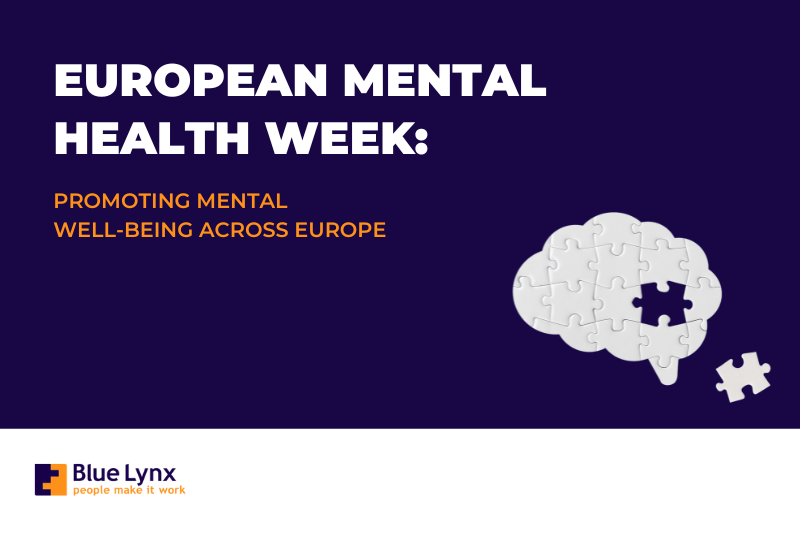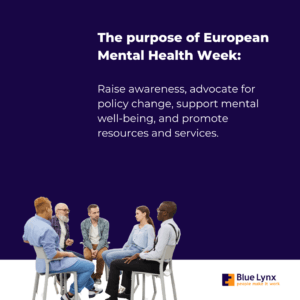To address the growing concerns surrounding mental health, European Mental Health Week (EMHW) has emerged as a significant campaign to raise awareness, educate the public, and promote mental well-being across the continent. This annual event has gained prominence as a platform to challenge the stigma surrounding mental health issues, provide support, and encourage open discussions about mental well-being. This article explores the importance of European Mental Health Week and highlights key statistics that underscore the need for increased attention to the subject.
Understanding the Scope of Mental Health in Europe
Mental health disorders affect millions of people in Europe, regardless of age, gender, or socioeconomic background. It is estimated that nearly one in four individuals will experience a mental health problem at some point in their lives. The prevalence of mental health issues highlights the urgency to address this public health concern and prioritize mental well-being.
Depression
Depression is one of the most common mental health disorders in Europe. According to the World Health Organization (WHO), approximately 50 million people in the European region are affected by depression, making it a leading cause of disability and a major contributor to the overall burden of disease.
Depression is a complex mental health disorder that can have a profound impact on an individual’s daily life. Recognising the symptoms of depression is crucial for early intervention and effective management.
Common symptoms may include persistent feelings of sadness, loss of interest in activities once enjoyed, changes in appetite or weight, fatigue, difficulty concentrating, feelings of worthlessness or guilt, and recurrent thoughts of death or suicide.
If you or someone you know is experiencing these symptoms, it is essential to seek professional help. Dealing with depression often involves a multifaceted approach. Treatment options may include therapy, medication, lifestyle changes, and support from loved ones. It is crucial to create a support network, engage in self-care activities, maintain a healthy lifestyle with regular exercise and a balanced diet, and prioritise activities that bring joy and fulfilment.
Seeking help from mental health professionals, such as therapists or psychiatrists, can provide invaluable guidance and support throughout the recovery process.
Remember, depression is treatable, and with the right support and resources, you can regain control of your life and find hope and happiness once again.
Anxiety Disorders
Anxiety disorders, including generalised anxiety disorder, panic disorder, and social anxiety disorder, also affect a significant portion of the population. The European Neuropsychopharmacology journal reports that anxiety disorders impact around 14% of the European population.
Anxiety disorders are prevalent mental health conditions characterised by excessive worry, fear, and anxiety that can interfere with daily functioning. Symptoms may include persistent feelings of unease, restlessness, irritability, racing thoughts, difficulty concentrating, muscle tension, sleep disturbances, and panic attacks.
If you or someone you know is experiencing these symptoms, it is important to consult with a mental health professional for an accurate diagnosis and treatment plan. Dealing with anxiety disorders often involves a combination of therapeutic approaches.
Cognitive-behavioural therapy (CBT) can be highly effective in helping identify and challenge negative thought patterns and develop coping strategies. Medication, such as anti-anxiety or antidepressant medications, may also be prescribed in some cases. Additionally, practising relaxation techniques such as deep breathing exercises, mindfulness, regular exercise, and maintaining a balanced lifestyle can contribute to managing anxiety. Seeking support from loved ones or support groups can provide valuable emotional assistance and improve the recovery process. With proper treatment and support, you can learn to manage and alleviate the impact of anxiety disorders, leading to improved overall well-being.
Suicide Rates
Suicide is a tragic outcome of untreated or undiagnosed mental health conditions. In Europe, approximately 140,000 people die by suicide each year. This represents an average of one suicide every four minutes.
Suicide rates are a deeply concerning issue that requires urgent attention, including in the Netherlands. In 2021, the Netherlands recorded a suicide rate of 10.6 per 100,000 people.
Common symptoms may include persistent feelings of hopelessness, withdrawal from social activities, changes in sleep patterns, loss of interest in previously enjoyed activities, expressing thoughts of self-harm or suicide, and giving away belongings.
Dealing with suicide prevention requires a comprehensive approach. Encouraging open conversations about mental health, reducing stigma, and providing access to mental health services are vital steps. Creating a supportive environment where people feel comfortable seeking help is crucial.
In cases of immediate risk, contacting emergency services or helplines is essential. Long-term strategies involve promoting mental well-being through education, raising awareness, and investing in mental health resources and services. Together, we can work towards reducing suicide rates by providing empathy, support, and accessible mental health care to those in need.
Work-Related Stress
This is a pervasive issue that can significantly impact mental health. Eurofound estimates that about 22% of workers in the European Union report experiencing stress-related symptoms frequently. This not only affects people’s mental well-being but also leads to decreased productivity and economic costs.
Work-related stress can have detrimental effects on both mental and physical well-being. Recognising the symptoms of work-related stress is essential in addressing the issue effectively. Symptoms may include persistent feelings of exhaustion, irritability, difficulty concentrating, sleep disturbances, physical tension, headaches, and a decline in work performance.
Dealing with work-related stress involves implementing strategies to manage and reduce its impact. Setting clear boundaries between work and personal life, practising time management, and prioritising self-care activities can help create a healthier work-life balance.
Effective communication with supervisors and colleagues about workload and expectations can also help alleviate stress.
Additionally, engaging in relaxation techniques such as deep breathing exercises, meditation, and regular exercise can help reduce stress levels. Seeking support from employee assistance programs, counselling services, or professional therapists can provide guidance and tools to manage work-related stress. Remember, taking proactive steps to address work-related stress is crucial for maintaining well-being and ensuring long-term career satisfaction.
Youth Mental Health
Mental health problems among young people are a pressing concern. According to the Trimbos Institute, one in five young people (aged 13-18) in the Netherlands struggles with mental health problems. This highlights the need for early intervention, support, and accessible mental health services for young people.
Youth-related stress is a growing concern in today’s fast-paced and competitive world. Adolescents and young adults often face unique challenges that can lead to increased stress levels.
Recognising the symptoms of youth-related stress is vital for early intervention and support. Symptoms may include irritability, mood swings, changes in appetite or sleep patterns, social withdrawal, academic decline, physical symptoms (such as headaches or stomachaches), and increased risk-taking behaviours.
Dealing with youth-related stress involves a multifaceted approach. Encouraging open communication and creating a safe space for young people to express their feelings and concerns is essential. Teaching stress management techniques, such as deep breathing exercises, mindfulness, and time management skills, can empower them to cope with stress effectively. Encouraging healthy lifestyle habits, including regular exercise, balanced nutrition, and sufficient sleep, can also contribute to stress reduction. Additionally, providing access to mental health resources, such as school counsellors or therapists, is crucial for those who may require professional support. By fostering resilience and providing tools to manage stress, we can support the mental well-being of our youth and help them navigate the challenges they face.
The Importance of European Mental Health Week
European Mental Health Week educates the public about mental health issues, challenging the stigma and misconceptions surrounding mental illness. It promotes understanding, empathy, and acceptance, encouraging people to seek help and support.
The campaign calls for policy reforms and increased investment in mental health services, aiming to ensure that mental health is given the priority it deserves in healthcare systems across Europe. By shedding light on the statistics and real-life experiences, European Mental
Health Week urges policymakers to take action.
EMHW provides a platform for people to share their stories, struggles, and coping strategies. It facilitates open discussions, promotes self-care, and highlights the importance of seeking professional help when needed. European Mental Health Week also encourages us to look out for each other, fostering a supportive community environment.
Furthermore, the campaign raises awareness of available mental health resources and services, allowing people to access appropriate support systems. It helps bridge the gap between those in need and the assistance they require by providing information about helplines, counselling services, and mental health organisations.
To sum it up
European Mental Health Week serves as a vital initiative to address the pressing mental health challenges faced across Europe. By highlighting important data, promoting awareness, and advocating for change, this campaign plays a pivotal role in shaping a society that prioritises mental well-being. It is only through collective efforts, support, and understanding that we can ensure everyone has access to the mental health care they need and deserve.











![Education vs. experience [Title] Job requirements: Education vs. experience](https://bluelynxcareers.bg/wp-content/uploads/bb-plugin/cache/Job-requirements-education-vs-experience-landscape-1ec43d95a48ad704bd7217ec829c042f-.png)


![Unlocking the Connection between Sleep, Work, and Productivity The Importance of Quality Rest for Optimal Performance [Title] Unlocking the Connection between Sleep, Work, and Productivity The Importance of Quality Rest for Optimal Performance](https://bluelynxcareers.bg/wp-content/uploads/bb-plugin/cache/Unlocking-the-Connection-between-Sleep-Work-and-Productivity-The-Importance-of-Quality-Rest-for-Optimal-Performance-landscape-2b91ccd746800d863e8c65276c6876c9-.png)
![Attracting Talent and Driving Innovation The Role of Sustainability in Modern Business [Headline] Attracting Talent and Driving Innovation The Role of Sustainability in Modern Business [Headline]](https://bluelynxcareers.bg/wp-content/uploads/bb-plugin/cache/Attracting-Talent-and-Driving-Innovation-The-Role-of-Sustainability-in-Modern-Business-landscape-7f26c9342f1650800e5633d1b4424d68-.png)

![Toxic productivity [Title] Toxic productivity](https://bluelynxcareers.bg/wp-content/uploads/bb-plugin/cache/Toxic-productivity-landscape-ce165975805cbbc4b58e4c23cf758014-.png)
